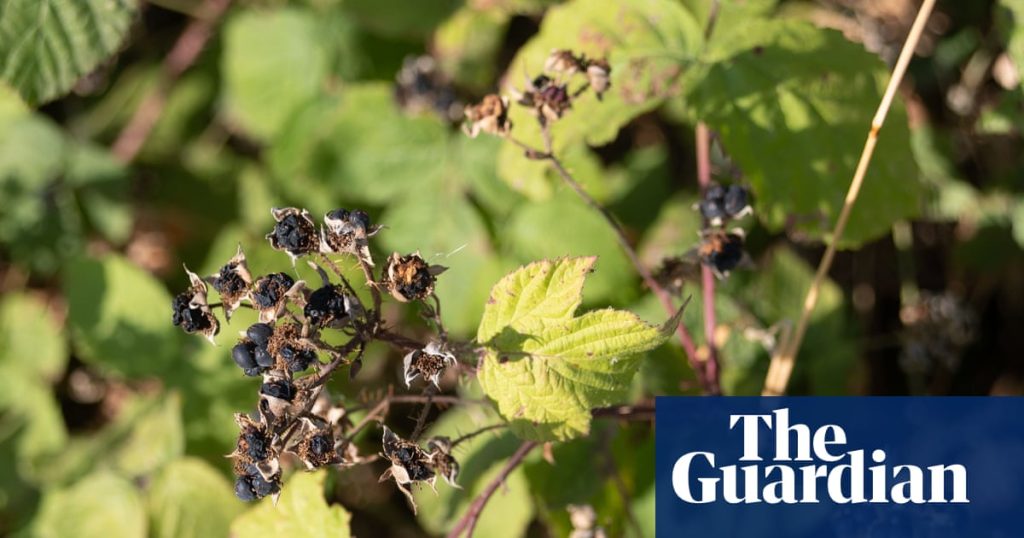Autumn is the “season of mists and mellow fruitfulness”, according to the poet John Keats – but anyone hoping for a glut of blackberries this September may be sorely disappointed.
In many parts of the UK brambles have been bursting with fruit since mid-summer, with some now bearing only shrivelled berries. And it is not the only hallmark of autumn that appears to have come early: trees are dropping their leaves, apples are ripe and acorns are hitting the ground.
But with temperatures still high, experts say this is not simply a case of an early fall. Instead, they say, nature is under stress.
England has just had its fourth heatwave of the summer, with temperatures reaching up to 33.4C, and five areas of the country are in drought.
“A lot of what we’re seeing has been caused by a very hot and very dry spring and summer, it’s been one of the driest periods on record,” said Kathryn Brown, the director of climate change and evidence at the Wildlife Trusts. “So it feels like autumn has come early, but it’s due to the natural environment reacting to that very extreme spring and summer, which is not average conditions that our species are adapted to in terms of seasonal cycles.”
Brown said some birch and poplar trees had already turned brown and were losing their leaves, while in her own garden acorns were already falling from oak trees. “Trees will set seed [earlier] as a reaction to stress, because they’re trying to employ an insurance strategy,” she said.
There have also been warnings about trees suddenly dropping branches. While the cause of this phenomenon is not clear, it often occurs after a prolonged period of dry weather.
According to the Met Office’s State of the UK Climate report, climate changes are causing shifts in many biological events in the UK. Prof Tim Sparks, a co-author of the report, noted that plants and insects were becoming active earlier in the year.
Sparks said earlier fruit ripening was a result of higher temperatures, with shrivelled blackberries arising because of a lack of water. “Leaf drop is also a water issue; it’s not autumn in the sense it’s not the end of the growing season if we get more rain,” he said.
While trees are dropping their leaves because of drought, Sparks said a warmer climate would generally be expected to result in trees holding on to their leaves for longer. Together with earlier fruit ripening, he said, that would result in a longer autumn.
While shifts in the timing of natural events can be discombobulating for humans, the ramifications could be serious for wildlife. As Brown points out, birds such as blackbirds tend to predominantly eat insects in the spring and summer and feed these to their chicks when they are breeding.
“But in the autumn, they switch to seeds and berries and fruits like blackberries. And if they’ve already come and gone, there’s going to be a food gap in the autumn,” she said.
Brown said this had serious implications for animals trying to get ready for winter, when food is scarce.
“It’s very hard to predict what the exact impacts are going to be for different species, but it is very worrying, because the seasonal cycle is completely out of whack at the moment and our wildlife is not adapted to that, so it’s definitely much more chaotic for them,” she said.
Farmers are also coming to terms with unpredictable weather. While the National Farmers’ Union said farmers and growers around the country were facing a varied picture in terms of crop yields this year, Rachel Hallos, its vice-president, said the increasing extreme weather was affecting farmers’ ability to produce food.
“Although parts of the country have seen some rainfall, and farmers are no strangers to unpredictable weather, the extremes this year have been unprecedented,” she said. “Last year’s harvest was marked by heavy rain; this year, it’s the lack of it. These fluctuations of drought and flood are becoming more pronounced and more regular.”
Hallos said food security must be a national priority and she called for the government to support farmers and growers to build resilience, stressing that investment was needed in climate adaptation and resilient crop varieties as well as water infrastructure.
Hallos’s concerns are supported by data from the Met Office, which has revealed winters are getting wetter and temperature extremes have increased, becoming more frequent and more intense. This June was the warmest ever recorded in England and the second warmest for the UK since records began in 1884.
Brown said a key concern was that the current conditions were occurring with global warming at about 1.5C above preindustrial levels, yet higher levels of warming were expected.
“That’s what really worries me is seeing the impacts now at this relatively low level of warming where things are already getting really stressed, and thinking about what’s this going to be like in five years or 10 years, or even next year,” she said. “It’s quite hard to predict, but it doesn’t look very hopeful.”

